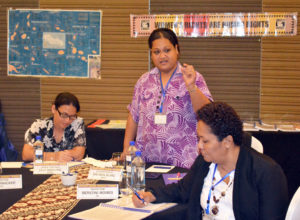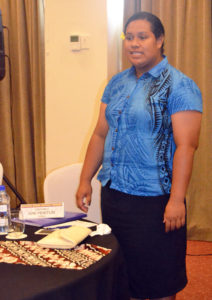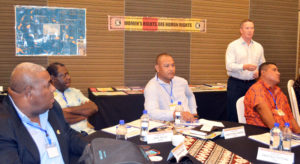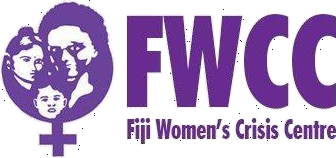Stepping Up The Pace In Achieving Gender Equality Within the Police
17 Apr, 2018
[NADI] 13 April 2018 Advocating for gender equality in traditionally male dominated spaces can be a challenging and isolating experience. Policing is no exception.
 Developing Gender Advocates within the police is the main objective of the Gender Advocacy Training (GAT) for Regional Executive Police, a groundbreaking initiative being rolled out by the Fiji Women’s Crisis Centre (FWCC) in partnership with the Australian Federal Police Regional PPRP-R.
Developing Gender Advocates within the police is the main objective of the Gender Advocacy Training (GAT) for Regional Executive Police, a groundbreaking initiative being rolled out by the Fiji Women’s Crisis Centre (FWCC) in partnership with the Australian Federal Police Regional PPRP-R.
Lead trainer and Coordinator of the FWCC, Shamima Ali said that during the planning stages it was critical for us that the police women were given an opportunity to have their own training separate for the men for the first stage of this advocacy program, “we wanted to ensure that there was a safe space where they could come and undergo some deep unpacking of all the gender issues in the Police, both challenges and opportunities,” said Ali.
Participants included a mixture of senior front-line police women to some of the most senior positioned police women from across the Pacific. Ali reminded the participants that gender advocates should be found at all levels because that is the best way support and solidarity is created.
“The learnings I’ve gained from here is so invaluable. I am definitely taking on this role as a gender equality advocate. I have access to key decision-making spaces like the Pacific Police Training Advisory Group (PPTAG), Women’s Advocacy Network (WAN), Pacific Islands Chiefs of Police (PICP), and Pacific Police Policy Network (PPPN), where I am going to make it a priority to speak on the issues we have discussed here in each of those spaces,” said Kalinda Blake, Deputy Commissioner Training and Prosecution, Nauru.
 Constable Iuni Penitusi, Police Prosecutor, Tuvalu, said that she believed being an effective gender advocate means making sure that all the basics are in place and where needed, improvements should be made, “one of the first things I am going to advocate for when I get back to Tuvalu is the development of a check-list for all violence against women and domestic violence cases so that our front-line police are given a step-by-step procedure through to investigations and prosecution staff. The check-list will also be a way of holding all police at all levels dealing with a domestic violence case accountable to due process and that the actions undertaken each step of the way is transparent,” said Iuni.
Constable Iuni Penitusi, Police Prosecutor, Tuvalu, said that she believed being an effective gender advocate means making sure that all the basics are in place and where needed, improvements should be made, “one of the first things I am going to advocate for when I get back to Tuvalu is the development of a check-list for all violence against women and domestic violence cases so that our front-line police are given a step-by-step procedure through to investigations and prosecution staff. The check-list will also be a way of holding all police at all levels dealing with a domestic violence case accountable to due process and that the actions undertaken each step of the way is transparent,” said Iuni.
A range of issues was discussed throughout the week including sexual harassment, challenges and barriers to accessing workplace promotions, lack of solidarity amongst women in the police force, gaps in policies and the impact of patriarchy, male privilege, tradition, culture and religion on achieving gender equality within the police force.
Closing the one week training was Brett Kidner, AFP Senior Liaison Officer International Operations Suva Fiji, “from the conversations I have had with some of you on the margins I am pleased to hear that the first stage of this advocacy training was very successful. You are the initial cadre of gender advocates within the Police. Your Police Commissioners are very supportive of this training and of your participation and they know you will be the major players in the organisation in terms of advocating for gender equality. We take small baby steps to affect change and Shamima and her team have looked carefully within your organisations at who could start to change gender based discriminative culture within the police,” said Brett.
[ENDS]
Background information on the Gender Advocacy Training (GAT) for Regional Executive Police
The Fiji Women’s Crisis Centre (FWCC) partnership with the Australian Federal Police Regional PPRP-R started in 2015. The first lot of four regional trainings was delivered to front line police across the Pacific on Gender, Human Rights and Ending All Forms of Violence Against Women.
Although very successful, it was agreed that training front line police was not going to be effective in creating cultural changes whiting the police unless those in the decision making spaces also underwent the training. As a result, another four trainings targeting Executive Level Police across the Pacific was developed, the latest was held in February 2018 with Police Commissioners in the Micronesian Region in Guam.
The Gender Advocacy Training (GAT) is the next level. It’s specifically aimed at developing and skilling-up gender advocates within the Police. It is a two stage training whereby stage one is assisting gender advocates to develop plans to advocate for in their respective organisations. There is a monitoring and evaluation process attached to stage one where technical support will also be available over a 12 month period for the gender advocates within policing. At the end of 12 months, the gender advocates will gather together under stage 2 of the training and assess the successes, challenges and barriers to achieving their plans.
For more information, please contact FWCC Coordinator Shamima Ali on +679 9992 875.
